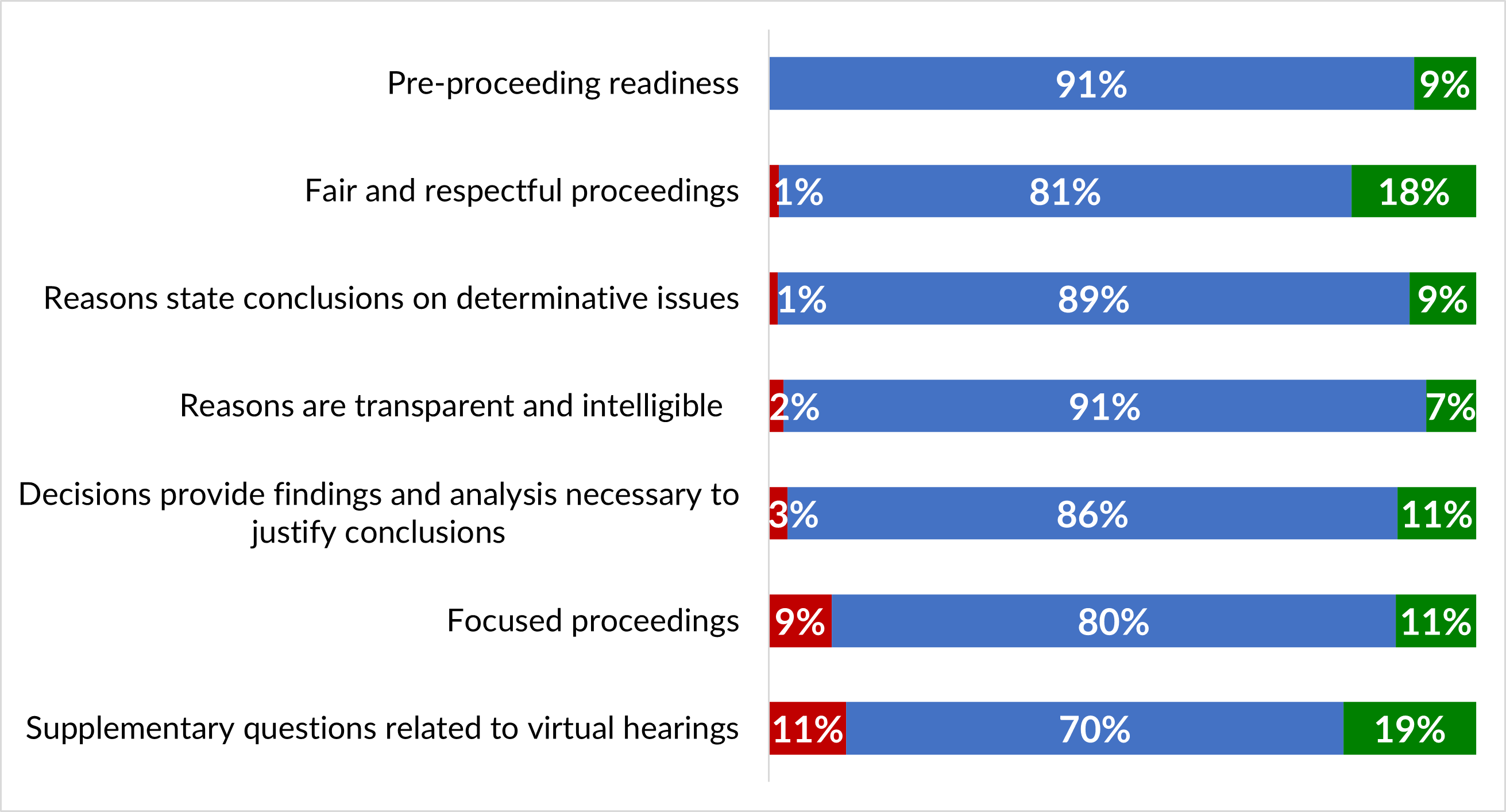Legend
|
|---|
Below expectations
|
Meets expectations
|
Exceeds expectations |
Methodology
80 cases reviewed | 32 indicators across 7 themes
The study aims to assess the quality of decision making to identify strengths and areas for improvement, as well as to inform performance reporting to the Treasury Board Secretariat (TBS). A third-party reviewer, Martine Valois, Full Professor at Université de Montréal’s Faculty of Law, was hired to conduct the assessment and was supported by the Audit and Evaluation team.
The cases in the sample were proportionally representative of the general population for region, language, and outcome.
Considerations
To ensure quality and consistency in the assessment, a reviewer was selected based on their in-depth knowledge of the
Immigration and Refugee Protection Act (IRPA), refugee and immigration matters, and administrative law. Their observations do not lend themselves to firm conclusions on legal matters such as the correct application of the law, the weighing of the evidence, or the fairness of the proceedings from a natural justice perspective. Only a court reviewing the case can arrive at such conclusions. Moreover, a small sample size limits the inferences that may be made about the broader caseload.
Overall performance

Text format – Overall performance
| Percentage of hearings that met or exceeded expectations: 97.5%Footnote 1 | 2.5% Below expectations | 97.5% Meets or exceeds expectations |
Performance by theme

Text format – Performance by theme
| Pre-proceeding readiness | 91% Meets expectations | 9% Exceeds expectations |
| Fair and respestful proceedings | 1% Below expectations | 81% Meets expectations | 18% Exceeds expectations |
| Reasons state conclusions on determinative issues | 1% Below expectations | 89% Meets expectations | 9% Exceeds expectations |
| Reasons are transparent and intelligible | 2% Below expectations | 91% Meets expectations | 7% Exceeds expectations |
| Decisions provide findings and analysis necessary to justify conclusions | 3% Below expectations | 86% Meets expectations | 11% Exceeds expectations |
| Focused proceedings | 9% Below expectations | 80% Meets expectations | 11% Exceeds expectations |
| Supplementary questions related to virtual hearings | 11% Below expectations | 70% Meets expectations | 19% Exceeds expectations |
Key indicators that impacted the lower scoring themes (e.g. Focused proceedings, Supplementary questions related to virtual hearings) were whether the member focused on narrowing issues during the hearing to assist counsel for their final representations, and the member failing to ask observers or witnesses if they were alone in the room.
What we did well
The Refugee Protection Division (RPD) performed well in many areas, especially in being well-prepared for hearings, ensuring respectful proceedings, and producing justified, transparent, and intelligible reasons.
- Members were well prepared for hearings. They had clearly read the documents on file and had good knowledge of the facts and main issues.
- Members clearly showed a level of sensitivity and respect that contributed significantly to the quality of the proceedings.
- Members ensured that claimants were fully participating in their own hearing.
- Questioning was focused and organized.
- Members clearly stated the issues, and their analysis followed the legal framework and their findings of fact to a clear, unambiguous conclusion.
- Members were receptive, attentive, and sensitive to the need to give due consideration to the unique characteristics of SOGIESC claimants and refrained from relying on stereotypes.
- Members were also sensitive, respectful, and non-confrontational while questioning claimants on intimate matters.
Recommendations
- Members who are applying Chairperson’s guidelines should mention in their reasons the specific section of these guidelines that is relevant to the issues they have to consider and its impact on the particular facts of the case.
- Members should make sure that they convey the same information in all cases regarding how the hearing will proceed.
- As a best practice, in SOGIESC cases, members should consider intersectional factors such as race, ethnicity, religion, age, and gender in their evaluation of the well-founded fear of persecution.
Management Response
IRB decision-makers are expected to apply Chairperson's guidelines or explain in their reasons for decision why they did not apply them. Requiring decision-makers to cite specific sections of the guidelines is not supported by the jurisprudence.
The RPD provided additional training subsequent to the review period and will put in place additional training and guidance for members on these topics, including ensuring training and guidance on guidelines is consistent with jurisprudence.
For more information
For further information, please consult the full report: Quality performance in the Refugee Protection Division 2022 to 2023.